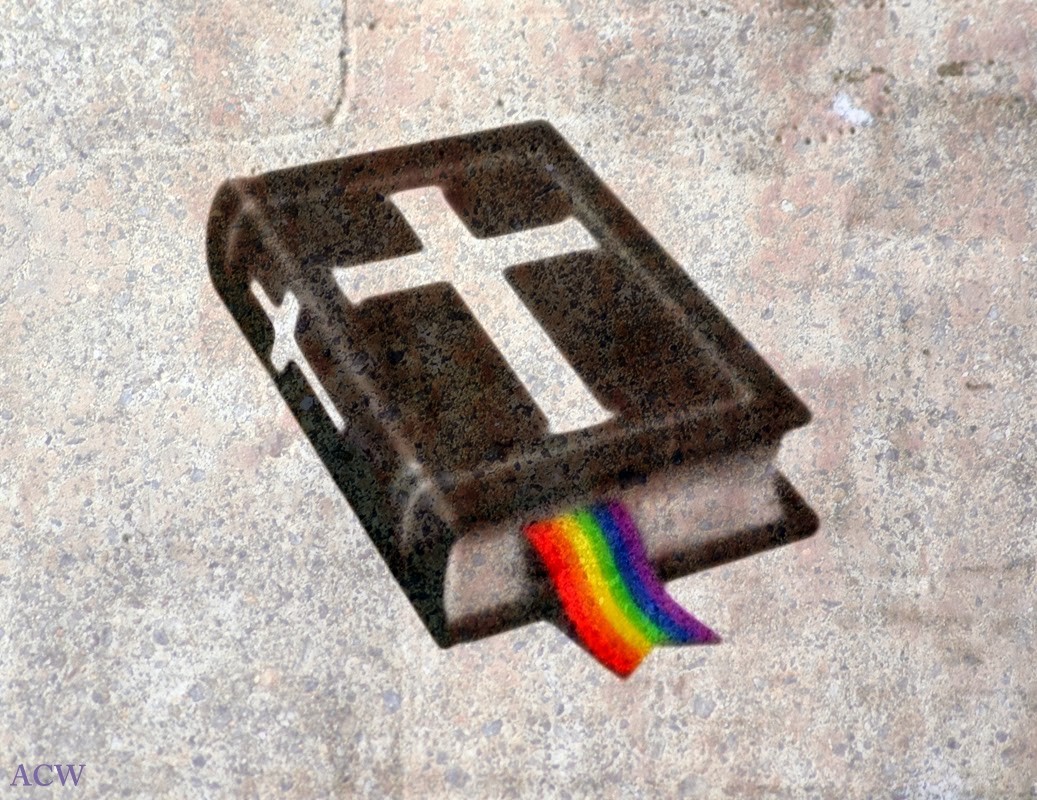The word ?homosexuality? didn?t even show up in English translations of the Bible until 1946, so why do we say the Bible condemns it?
 ?Bible with Awareness (Beibl gydag ymwybyddiaeth)? by Andrew Craig Williams
?Bible with Awareness (Beibl gydag ymwybyddiaeth)? by Andrew Craig Williams
Billy Graham?s son is terrified that President Obama and a whole host of us have chucked out our Bibles in order to support marriage equality. This week he was at it again on Facebook, railing against ?the assault on biblical marriage,? referencing California lawmakers who want to amend federal law by striking gendered language pertaining to two partners in a legal marriage. Franklin, son of Billy, even goes on to make the Biblically inaccurate comment that ?The One who created marriage defined it as between a man and a woman.? I wish he would read my post on this and then re-read the Bible.
Brother Franklin, even thinks that President Obama should invest in more lightning rods in case God strikes the White House in fiery wrath.
This is laughable if it weren?t so powerfully sad. Here?s the thing, Franklin: you need to read your Bible better. The sooner you do, the more and better work you can do in Africa and elsewhere with Samaritan?s Purse. We need your time focused not only on poverty but in addressing America?s original sin of racism. We need all you got for those fights. It?s time to end the culture wars and fully focus on the war against poverty, racism and injustice in our world.
Jim Wallis, founder of Sojourners, a mentor in the faith, talks about the early days of gathering his new community, coming out as Evangelicals during the Vietnam crisis, going back to the Bible for help and guidance.
One of our first activities was finding every verse of scripture about the poor, wealth and poverty, and social justice. We found more than 2,000 texts that we then cut out of an old Bible. We were left with a ?Bible full of holes,? which I used to take out with me to preach.
Over 2000 Bible verses on poverty. On money. On the rich and poor.
And those 2000+ verses give us some basic instructions for life on earth, that could be summed up in the ancient wisdom of a prophet 700 years before Jesus of Nazareth:
He has told you, O mortal, what is good; and what does the Lord require of youbut to do justice, and to love kindness, and to walk humbly with your God? ? Micah 6:8
And yet, all anyone wants to talk about these days are six Bible verses that ?condemn homosexuality.? Here?s the thing ? they don?t.
And we need to accept that so we can get back to the more important things.
Six Bullets in the Chamber?
There are six Bible verses used to defend a ?traditional? view on homosexuality. However well intentioned, these verses are known as the ?trouble verses? that condemn same-sex behavior. Some call them clobber verses. I like how my friend Steve Chalke in the UK describes them as ?the six bullets in the gun.?
What do we do with these Bible verses? We must read them in context. And take the bullets out of the chamber. It?s time for a cease-fire.
 Photo by Misfit Photographer via Flickr Creative Commons
Photo by Misfit Photographer via Flickr Creative Commons
Genesis 19:5
and they called to Lot, ?Where are the men who came to you tonight? Bring them out to us, so that we may know them.?
This is the fabled Sodom & Gomorrah passage. Sodom and Gomorrah were sister cities. It?s pretty clear in Genesis 13:13 that ?? the people of Sodom were wicked, great sinners against the Lord.?
What was their sin? They were ruthless in their acquisition of wealth, power and territory ? and they oppressed the poor and took advantage of the weak and were terrible at hospitality.
That?s clear in the Bible, too.
The ancient Jewish Prophet Ezekiel remembered the sin of Sodom as such: This was the guilt of your sister Sodom: she and her daughters had pride, excess of food, and prosperous ease, but did not aid the poor and needy. They were haughty, and did abominable things before me; therefore I removed them when I saw it. ? Ezekiel 16:49,50
The sins of Sodom, Gomorrah and their sister cities was so bad, they were frequently used as examples of people not to emulate.
Jeremiah, one of Ezekiel?s prophetic comrades, simply stated:
As when God overthrew Sodom and Gomorrah and their neighboring cities, declares the Lord, so no man shall dwell there, and no son of man shall sojourn in her. ? Jeremiah 50:40
When Jesus would run into conflict in cities he was ministering in, unfolding his work and vision amongst the poor, he even used Sodom as an example when he would declare ?it shall be more tolerable on the day of judgment for the land of Sodom than for you.? (Matthew 11:24)
Here?s the deal: the so-called ?Sodomites? in Genesis are beating down the door of a man named Lot who was entertaining two messengers of God (we often hear them described as ?angels? in the Scriptures.) The men of Sodom want to have sexual intercourse with them. Fair enough, you might say. But in the end, Lot offers up his two virgin daughters for the so-called Sodomites to gang rape. It?s brutal, horrendous stuff. And it has nothing to do with homosexuality. So why do we continue to think it does?
Leviticus 18:22 & 20:13
You shall not lie with a male as with a woman; it is an abomination.
If a man lies with a male as with a woman, both of them have committed an abomination; they shall be put to death; their blood is upon them.
The ?Levitical laws? are important, foundational commandments for a people looking to survive. For a people on the move. For a people looking to make a way out of no way.
They?re literally on the run ? an exodus ? out of Egypt. And these passages have nothing to do with homosexuality either.
Jeff Chu, in his incredible book Does Jesus Really Love Me?: A Gay Christian?s Pilgrimage in Search of God in America, shares a series of Twitter and email exchanges with a fellow traveller on the way, a man named Gideon Eads. In one email Gideon shares about talking with a counselor who tried to convince him of the sins of homosexuality. Gideon writes:
We moved on to the verses in Leviticus that state ?lying with a man as with a woman is an abomination? (Leviticus 18: 22? 24 and Leviticus 20: 13). He began to talk about how holy and perfect the union between one man and one woman was. I agreed, but said, ?This is not a verse about homosexual love, or being gay. This command is there with all kinds of connotations of adultery, promiscuity, and idol worship from the surrounding nations.?
Yep, that?ll preach.
And if we want to get all Levitical about it, the same laws dictate that shellfish cannot be eaten (there goes Boston clam chowder and Willapa Bay oysters), mixed fabric garments cannot be worn (I guess I need to burn my Portland Timbers jersey), and sex with animals is strictly forbidden (yep, I totally agree).
Romans 1:26?27
So, go ahead, throw out the Old Testament passages, some Christians might say (foolhardily ? this was Jesus? Bible after all). What about the New Testament? Enter St. Paul?s magnum opus, the Roman Epistle, and his ?clear teaching? on same-sex behavior.
For this reason God gave them up to degrading passions. Their women exchanged natural intercourse for unnatural, and in the same way also the men, giving up natural intercourse with women, were consumed with passion for one another. Men committed shameless acts with men and received in their own persons the due penalty for their error.
Steve Chalke makes the argument that ?Idolatry, promiscuity and shrine prostitution are what Paul is addressing [here] in Romans 1 ? not same-sex relationships between faithful and committed partners.?
Steve is right. This passage is clearly not about same-sex behavior carte blanche. It?s about gross misuse of power, Roman elitist overindulgence, and misguided over-sexualized spirituality.
If you are looking to get really Biblical about this passage and all of these verses, go no further than James Brownson?s tremendous Bible, Gender, Sexuality: Reframing the Church?s Debate on Same-Sex Relationships.
Jim is a New Testament scholar in Michigan who takes the Bible incredibly seriously. He thinks this passage is about excessive lust: the central problem with lust in Romans 1 is that it is an expression of idolatry in a specific sense: lust involves serving one?s own self-seeking desires rather than worshiping the one true God.
But more so than just excessive lust and how the early Christian communities should reject it, Brownson argues that this lust was being exhibited at a colossal scale by members of the Roman imperial court.
Emperors Gaius and Caligula conjure up all sorts of sexual indulgence. Brownson says this, echoing the work of Neil Elliot:
Neil Elliott has called attention to the striking similarities between Paul?s language and the incredible greed, violence, and sexual excesses of Gaius Caligula, an emperor who reigned in a period not too long before Paul wrote Romans. First of all, Gaius is closely linked to the practice of idolatry. The Roman writer Suetonius reports how Gaius ?set up a special temple to his own godhead, with priests and with victims of the choicest kind.? Another Roman writer, Dio Cassius, comments negatively on how Gaius was the only emperor to claim to be divine and to be the recipient of worship during his own lifetime. Gaius also tried at one point to erect a statue of himself in the Temple in Jerusalem; he was dissuaded only by a delegation from Herod Agrippa. Hence the link between Gaius and idolatry would have been well-known indeed, particularly in Jewish circles. But Gaius also serves as ?Exhibit A? for out-of-control lust. Suetonius reports how Gaius ?lived in perpetual incest with all his sisters, and at a large banquet he placed each of them in turn below him, while his wife reclined above.? He records gruesome examples of Gaius?s arbitrary violence, vindictiveness, and cruelty. Later, Suetonius chronicles Gaius?s sexual liaisons with the wives of dinner guests, raping them in an adjoining room and then returning to the banquet to comment on their performance. Various same-sex sexual encounters between Gaius and other men are similarly recounted. Finally, a military officer whom he had sexually humiliated joined a conspiracy to murder him, which they did less than four years into his reign. Suetonius records that Gaius was stabbed through the genitals when he was murdered. One wonders whether we can hear an echo of this gruesome story in Paul?s comments in Romans 1: 27: ?Men committed shameless acts with men and received in their own person the due penalty for their error.? Gaius Caligula graphically illustrates the reality of which Paul speaks in Romans 1: the movement from idolatry to insatiable lust to every form of depravity, and the violent murderous reprisal that such behavior engenders.
This is not the stuff of friends, loved ones, neighbors and colleagues who happen to be gay and celebrate marriage equality. So why do pastors continue to preach this?
1 Corinthians 6:9?11
Do you not know that wrongdoers will not inherit the kingdom of God? Do not be deceived! Fornicators, idolaters, adulterers, male prostitutes, sodomites, thieves, the greedy, drunkards, revilers, robbers ? none of these will inherit the kingdom of God. And this is what some of you used to be. But you were washed, you were sanctified, you were justified in the name of the Lord Jesus Christ and in the Spirit of our God.
This is one of the most damning, hurtful, and misused passages that Christians have often used to LGBTQ people to convince them of their sin. In essence, many Christians will shoot this Biblical bullet in the heart of others to condemn people straight to hell.
This needs to stop. If not yesterday, today.
This is one of those passages that, I would argue, has a direct corollary to the rise in gay Christian suicides in the past generation.
My friend Matthew Vines shares:
I am far from the only gay Christian who has heard the claim that gay people will not inherit the kingdom of God. That message is plastered on protest signs at gay-pride parades. It?s shouted by roaming street preachers at busy intersections and on college campuses. The result is that, for many lesbian, gay, bisexual and transgender people, all that they?ve heard about the kingdom of God is that they won?t be in it.
The problem is, people have horrifically misunderstood two simple words in this ancient letter that St. Paul wrote to an early Christian community in the trade city of Corinth.
The words are: malakoi and arsenkoitai.
Matthew goes on to define malakoi as ?effeminate.? It?s a Greek word that literally means ?soft? and is used to describe fine clothing elsewhere in the New Testament. In a moral context, this word is actually more about ?lack of self-control, weakness, laziness, or cowardice.? My friend David, a pastor who got kicked out of his church for false accusations, told me over nachos recently that this word is actually about people who were ?spineless.? Soft to the point that they wouldn?t stand up for injustice or what truly matters. Irony of ironies, huh?
There were sexual connotations for ?malakoi? as well, but again, it always points backs to uncontrolled acts of lust or misused sexuality ? no matter the gender or act. The word was not understood to reference same-sex behavior in the church until after the 20th century, when Bible translations adopted a new slant.
Arsenkoitai is more bizarre and hard to grasp. Many believe that St. Paul actually invented the word, as it is extremely rare in ancient Greek literature.
The word literally is a combination of two other words in Greek: arsen (male) and koites (bed). So, arsenkoitai could be translated literally as ?male-bedders.? And this word was understood by Bible translators before the 20th century to mean male-male sexual intercourse.
But when the word is used elsewhere in ancient Greek literature, it references the abuse of the poor (as in the Sibylline Oracles) or ?economic exploitation and power abuses (as in a 2nd century text called the Acts of John).? The Acts of John lists arsenkoitai amongst a list of sins separate from a catalog of other sexual sins. Many believe (as Vines so cogently breaks down) that arsenkoitai is about economic abuses and exploitation.
Which is why the ancient act of ?pederasty? is often brought up in relation to passages like this? the practice of Greek elite elder men who would adopt young men to use as sexual objects. Again, having nothing to do with LGBTQ loved ones, friends, and colleagues who are looking to live as good neighbors.
1 Timothy 1:9?10
This means understanding that the law is laid down not for the innocent but for the lawless and disobedient, for the godless and sinful, for the unholy and profane, for those who kill their father or mother, for murderers, fornicators, sodomites, slave-traders, liars, perjurers, and whatever else is contrary to the sound teaching?
The word asrenkoitai is used again, in this passage. Justin Lee, founder of the Gay Christian Network, describes growing up gay in the Southern Baptist Church in his book Torn: Rescuing the Gospel from the Gay-vs-Christian Debates.
Searches through several reference books taught me that ?homosexual offenders? was a translation of the Greek word arsenokoitai. To my surprise, one reference book listed the same word as appearing in another passage, 1 Timothy 1: 10. I turned to 1 Timothy 1: 10 in my New International Version Bible, and, there, saw that the word was translated simply as ?perverts.? There?s quite a difference between ?homosexual offenders? and ?perverts.?
Justin points out what many of us have long-since discovered: the Bible is a complicated library of books with antiquated, complicated Greek terminology and social contexts. Modern day translators are bound to mess it up from time to time or even insert their own biases. To quote my seminary professor Klyne Snodgrass ?the translator is always a traitor.?
So, now what?
I?ve spent the last year ? and especially so the last month ? hearing from LGBTQ parishioners, neighbors and friends their struggles growing up in the church. Horrible stories of anguish. Losing jobs, losing schools, losing friends and family. An unnecessary wreckage of human life in the name of faith.
It?s time to bring an end to this ? and not just because the Supreme Court has ruled in favor of Marriage Equality. It?s time to bring an end to this, for those of us trying to take the Bible seriously, because the Bible seriously doesn?t talk about homosexuality as we know it.
If you?re looking for resources to go deeper, spend a few days over at Togetherinthis.net, a tremendous online resource set up by EastLake Church outside Seattle.
I also cannot recommend the following enough:
- Vicky Beeching ? anything she does! Follow her on Twitter.
- James Brownson ? Bible, Gender, Sexuality: Reframing the Church?s Debate on Same-Sex Relationships
- Steve Chalke ? A Matter of Integrity (watch his intro video here)
- Jeff Chu, Does Jesus Really Love Me?: A Gay Christian?s Pilgrimage in Search of God in America
- Candace Czubernat ? her blog!
- Broderick Greer ? Twitter! Also his posts on Everyone Is Gay
- Justin Lee, Torn: Rescuing the Gospel from the Gays-vs.-Christians Debate
- Colby Martin ? follow his exciting project ?Unclobber!?
- Stan Mitchell ? check out his incredible sermon from GracePointe, TN
- Brandan Robertson ? an incredible organizer, visit his website
- Matthew Vines, God and the Gay Christian: The Biblical Case in Support of Same-Sex Relationships
- Ken Wilson, A Letter to My Congregation (a must read for pastors!)
Julie Rodgers, a self-proclaimed celibate gay Christian, is incredibly courageous. She just resigned this week from her chaplaincy position at Wheaton College because she believes this: some LGBTQ people are called to celibacy and some are called to marriage.
Echoing St. Paul, the truth we find ourselves in, is that some folks are called to celibacy and some are called to marriage ? no matter if they are gay or straight or wherever on the sexuality spectrum.
Julie closes her ground breaking post with this:
My goal now is the same as it?s always been: to do justice, love mercy, and walk humbly with the God who?s been my first love all along. When it comes to this conversation, my goal has been to help Christians create the kinds of communities that make LGBT people feel wanted ? where we can worship God, use our gifts, serve our neighbors, and find a family to share in the joys and sorrows of living in a world where so many people are so lonely. That looks a little different to me now that I?ve seen so much fruit in affirming communities, but it?s a widening of my circle ? not a move in a different direction.
If it turns out that I?m wrong, I trust God will be faithful to catch me. For now, though, I hope those of you who disagree will continue to welcome my friendship and serve alongside me. It?s not too late to call it quits on all the fighting. We could choose instead to focus on all we share in common and seek to mend what?s been broken in this fragile world.
It?s time for us to get back to the basics of the Bible and truly read it so that we might faithfully live it.
Do yourself a favor and head on over to Julie?s blog, and if you are the praying kind, pray for her and pray for all of us as we move out of this unnecessary, harmful and unbiblical mess so we can move forward to what truly matters.
Franklin, will you consider this?


